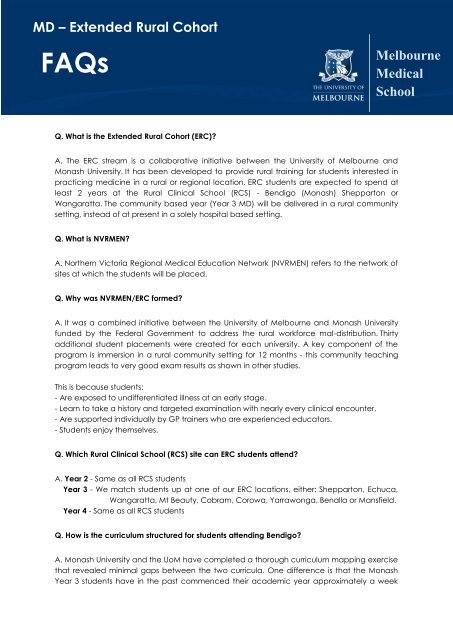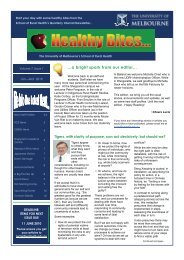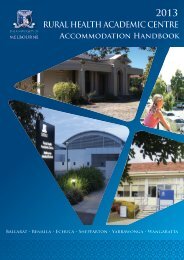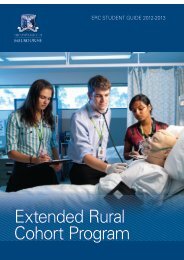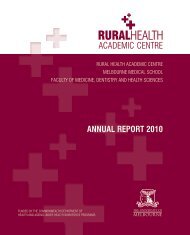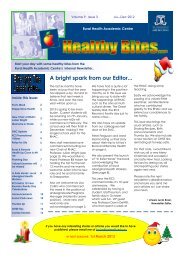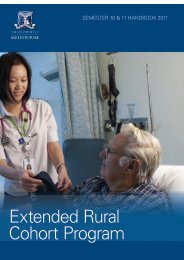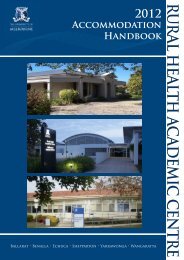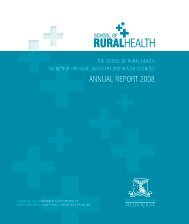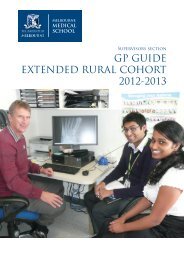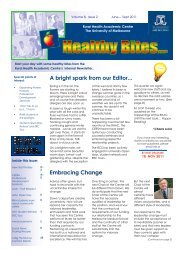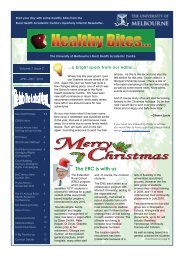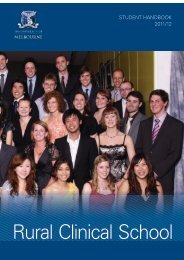MD – Extended Rural Cohort Melbourne Medical School
MD – Extended Rural Cohort Melbourne Medical School
MD – Extended Rural Cohort Melbourne Medical School
You also want an ePaper? Increase the reach of your titles
YUMPU automatically turns print PDFs into web optimized ePapers that Google loves.
<strong>MD</strong> <strong>–</strong> <strong>Extended</strong> <strong>Rural</strong> <strong>Cohort</strong><br />
FAQs<br />
<strong>Melbourne</strong><br />
<strong>Medical</strong><br />
<strong>School</strong><br />
Q. What is the <strong>Extended</strong> <strong>Rural</strong> <strong>Cohort</strong> (ERC)?<br />
A. The ERC stream is a collaborative initiative between the University of <strong>Melbourne</strong> and<br />
Monash University. It has been developed to provide rural training for students interested in<br />
practicing medicine in a rural or regional location. ERC students are expected to spend at<br />
least 2 years at the <strong>Rural</strong> Clinical <strong>School</strong> (RCS) - Bendigo (Monash) Shepparton or<br />
Wangaratta. The community based year (Year 3 <strong>MD</strong>) will be delivered in a rural community<br />
setting, instead of at present in a solely hospital based setting.<br />
Q. What is NVRMEN?<br />
A. Northern Victoria Regional <strong>Medical</strong> Education Network (NVRMEN) refers to the network of<br />
sites at which the students will be placed.<br />
Q. Why was NVRMEN/ERC formed?<br />
A. It was a combined initiative between the University of <strong>Melbourne</strong> and Monash University<br />
funded by the Federal Government to address the rural workforce mal-distribution. Thirty<br />
additional student placements were created for each university. A key component of the<br />
program is immersion in a rural community setting for 12 months - this community teaching<br />
program leads to very good exam results as shown in other studies.<br />
This is because students:<br />
- Are exposed to undifferentiated illness at an early stage.<br />
- Learn to take a history and targeted examination with nearly every clinical encounter.<br />
- Are supported individually by GP trainers who are experienced educators.<br />
- Students enjoy themselves.<br />
Q. Which <strong>Rural</strong> Clinical <strong>School</strong> (RCS) site can ERC students attend?<br />
A. Year 2 - Same as all RCS students<br />
Year 3 - We match students up at one of our ERC locations, either: Shepparton, Echuca,<br />
Wangaratta, Mt Beauty, Cobram, Corowa, Yarrawonga, Benalla or Mansfield.<br />
Year 4 - Same as all RCS students<br />
Q. How is the curriculum structured for students attending Bendigo?<br />
A. Monash University and the UoM have completed a thorough curriculum mapping exercise<br />
that revealed minimal gaps between the two curricula. One difference is that the Monash<br />
Year 3 students have in the past commenced their academic year approximately a week
earlier in February compared to UoM for orientation, which UoM students are encouraged to<br />
attend. Bendigo students will sit the same exams as all UoM medical students.<br />
Q. How is the ERC different to the regular UoM medical curriculum?<br />
A. Year 2 - Same as all UoM medical student curriculum.<br />
Year 3 - “Community Based Year”<br />
Year 4 <strong>–</strong> This is yet to be finalised <strong>–</strong> but ERC students will be offered a „Vocational<br />
Selective” (could be metro).<br />
Q. Are there any differences with examinations?<br />
A. The exams are the same for all UoM medical students. Due to the format of the<br />
Community Based Year, (Year 3)) the majority of the assessment takes place at the end of<br />
year, except for psychiatry which was assessed in 2011 at the end of the first semester. The<br />
rest of the assessments need to be at the end due to the integrated delivery over the entire 2<br />
semesters.<br />
Q. Where are the “Community Based Year” locations?<br />
A. Shepparton, Echuca, Wangaratta, Mt Beauty, Cobram, Corowa, Yarrawonga, Benalla or<br />
Mansfield.<br />
Q. What will I learn in the “Community Based Year?”<br />
A. The same curriculum as other UoM medical students - Child and Adolescent Health,<br />
Women‟s Health, Psychiatry, GP and Aged Care.<br />
Q. What are the hours during the “Community Based Year?”<br />
A. It is expected that you are available from 8am-5pm Monday to Friday. Occasionally<br />
learning opportunities occur outside of these hours. In the past students have been expected<br />
to be available in the evening and on some weekends.<br />
Q. How will the teaching happen?<br />
A. All practices currently take UoM semester 12 students and are highly experienced GP<br />
teachers. Most are affiliated with vocational training for GP registrars.<br />
Q. Will I be ready to see patients?<br />
A. In this model, students will be given the appropriate training prior to commencing the<br />
“Community Based Year”. In the first 6 weeks of your placement, 3 of these weeks will be<br />
intensive training, delivered in either Shepparton or Wangaratta.
Q. Will I be alone in the “Community Based Year?”<br />
A. Students will be placed in pairs during the “Community Based Year”, some placements will<br />
have more than 2 students at each location.<br />
Q. Can I choose where I am located for the “Community Based Year?”<br />
A. Students will be able to express preferences for sites and practices. A standard allocation<br />
process is in place.<br />
Q. How much will it cost for me to live at the accommodation?<br />
A. The plan is for ERC students to pay the same as RCS students, which is $40pw (as at<br />
semester 1 2012) for accommodation for 5 semesters. This will also include the “Community<br />
Based Year”.<br />
Q. Do I need a vehicle or is there transport available?<br />
A. It is recommended that all ERC students have their own reliable transport. Sites vary with<br />
travel requirements and distances.<br />
Q. As an ERC student, how many semesters will I be placed at the RCS for?<br />
A. <strong>MD</strong> ERC students will spend at least 4 semesters rurally, 2 semesters (Year 2) will be at one<br />
of our RCS large regional locations and 2 semesters (Year 3) which will be spent in the<br />
„Community Based Year‟ somewhere in Northern Victoria. *Year 4 planning is still in progress.<br />
Q. Would spending time rurally disadvantage my chance of internship selection at my<br />
preferred location?<br />
A. The majority of RCS students receive their first preference for internship location.<br />
Q. Is it possible to defer an ERC place?<br />
A. Deferral of a place may be required because of personal circumstances but because of<br />
the limited capacity of teaching practices numbers are "capped" to some extent, so finding<br />
a place in a subsequent cohort may be problematic.<br />
Q. Can I join the ERC?<br />
A. The ERC Program Coordinator Di Doyle, is keeping a reserve list of interested students keen<br />
to participate in the ERC. Expressions of interest detailing reasons why students wish to<br />
participate in the community year should be directed in writing to Di Doyle<br />
ddoyle@unimelb.edu.au and Dr Keppel pkeppel@unimelb.edu.au. Preference will be given<br />
to students who demonstrate a commitment to rural medicine.


